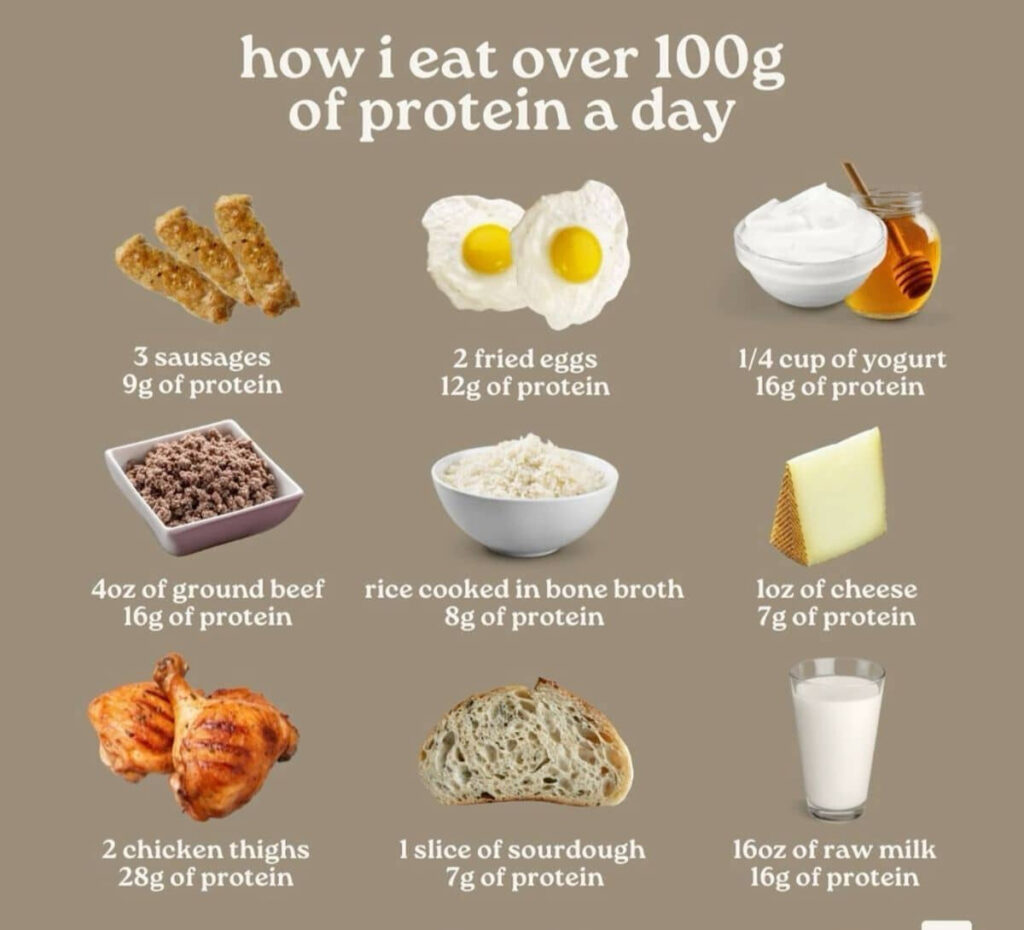How to Eat Over 100g of Protein a Day: A Comprehensive Guide
Protein is an essential macronutrient that plays a crucial role in building and repairing tissues, producing enzymes and hormones, and supporting overall health. Whether you’re an athlete, fitness enthusiast, or simply looking to improve your diet, consuming enough protein is vital. This article will guide you through a day of eating that provides over 100 grams of protein, offering practical tips and meal ideas to help you meet your protein goals.
Why Protein is Important
Protein is made up of amino acids, which are the building blocks of your body. It is essential for:
- Muscle Repair and Growth: Protein helps repair muscle tissues and supports muscle growth, especially important for those who exercise regularly.
- Hormone Production: Proteins are involved in the creation of hormones that regulate various bodily functions.
- Immune Function: Antibodies, which are crucial for immune response, are proteins.
- Satiety: Protein-rich foods can help you feel full longer, aiding in weight management.
A Day of Eating Over 100g of Protein
Here’s a breakdown of how you can consume over 100 grams of protein in a day, inspired by @bewellshel’s approach.
Breakfast: High-Protein Start
3 Sausages:
- Protein: 27g (9g per sausage)
- Tips: Choose high-quality sausages with minimal additives. Pair with vegetables for added nutrients.
2 Fried Eggs:
- Protein: 12g (6g per egg)
- Tips: Cook eggs in a healthy fat like olive oil or avocado oil. Add spinach or tomatoes for extra vitamins.
1/4 Cup of Yogurt:
- Protein: 4g
- Tips: Opt for Greek yogurt for higher protein content. Add a drizzle of honey or some berries for flavor.
Total Breakfast Protein: 43g
Lunch: Protein-Packed Meal
4oz of Ground Beef:
- Protein: 28g
- Tips: Use lean ground beef or turkey. Season with herbs and spices for added flavor without extra calories.
Rice Cooked in Bone Broth:
- Protein: 4g (varies based on broth)
- Tips: Cooking rice in bone broth adds extra protein and nutrients. Add vegetables like peas or carrots for a balanced meal.
1oz of Cheese:
- Protein: 7g
- Tips: Choose a cheese you enjoy, such as cheddar or mozzarella. Use it as a topping or side.
Total Lunch Protein: 39g
Dinner: Satisfying and Nutritious
2 Chicken Thighs:
- Protein: 28g (14g per thigh)
- Tips: Bake or grill chicken thighs with a mix of spices. Serve with a side of roasted vegetables.
1 Slice of Sourdough Bread:
- Protein: 4g
- Tips: Sourdough is a good source of probiotics. Pair with a healthy spread like avocado or hummus.
16oz of Raw Milk:
- Protein: 16g
- Tips: If raw milk is not available, opt for whole milk or a high-protein plant-based alternative.
Total Dinner Protein: 48g
Snacks and Extras
Nuts and Seeds:
- Protein: Varies (e.g., 1oz of almonds has 6g)
- Tips: Keep a mix of nuts and seeds for a quick protein boost.
Protein Shake:
- Protein: 20-30g (depending on the brand)
- Tips: Use a high-quality protein powder mixed with water, milk, or a milk alternative.
Total Snacks Protein: 26-36g
Total Daily Protein: 156-166g
Tips for Increasing Protein Intake
- Plan Your Meals: Prepare your meals in advance to ensure you’re meeting your protein goals.
- Choose High-Protein Foods: Incorporate a variety of protein sources like meats, dairy, legumes, and nuts.
- Use Protein Supplements: Protein powders and bars can be convenient options to boost your intake.
- Balance Your Diet: Ensure you’re also consuming enough carbohydrates and fats for a balanced diet.
- Stay Hydrated: Drinking plenty of water is essential, especially when consuming high amounts of protein.
Benefits of a High-Protein Diet
1. Muscle Maintenance and Growth:
Adequate protein intake is crucial for muscle repair and growth, especially for those who engage in regular physical activity.
2. Weight Management:
Protein-rich foods can help you feel full longer, reducing the likelihood of overeating and aiding in weight management.
3. Improved Metabolism:
Protein has a higher thermic effect compared to fats and carbohydrates, meaning your body burns more calories digesting protein.
4. Better Bone Health:
Protein is essential for bone health, helping to maintain bone density and reduce the risk of fractures.
5. Enhanced Immune Function:
Proteins are involved in the production of antibodies and immune system function, helping to protect against illnesses.
Conclusion
Consuming over 100 grams of protein a day is achievable with careful planning and the right food choices. By incorporating a variety of protein-rich foods into your meals and snacks, you can meet your protein needs and enjoy the numerous health benefits that come with it. Whether you’re looking to build muscle, manage your weight, or simply improve your overall health, a high-protein diet can be a valuable part of your nutritional strategy.
Start implementing these tips today and take the first step towards a healthier, more protein-rich diet. Remember, consistency is key, and with time, you’ll find it easier to meet your daily protein goals. Happy eating!










